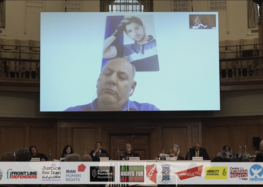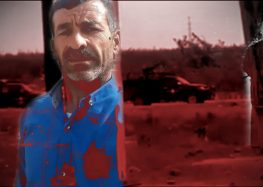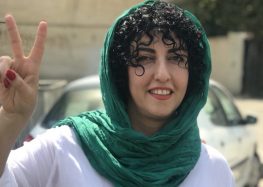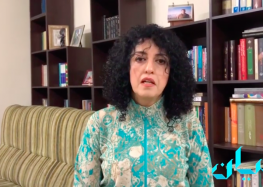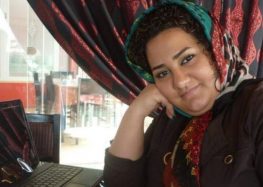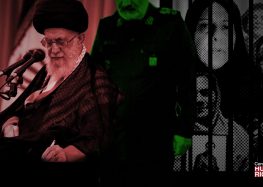Slain Protester’s Father Will File Suit to Find Killer, Calls for Accountability for State Violence
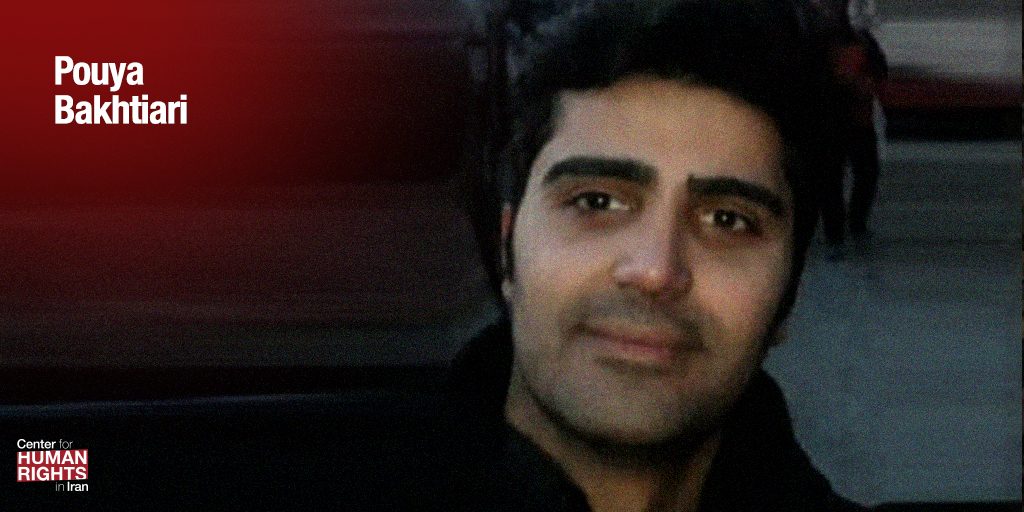
27-Year-Old Died from Bullet to Head Amidst Violent State Assault on Protestors
Manouchehr Bakhtiari, the father of a young protestor who was shot to death as he participated in the recent protests in Iran, will file a complaint with judicial authorities demanding the identification of the person responsible for killing his son, he told the Center for Human Rights in Iran (CHRI) on November 28.
Pouya Bakhtiari, 27, died of a bullet wound to the head in his mother’s arms on November 16 in the Mehrshahr district of Karaj, west of the capital Tehran. According to the death certificate, he lost his life due to “being struck by a bullet,” his father told CHRI.
The protests that started peacefully across Iran in response to the announcement of a gasoline price hike, were met with a violent state response that included the firing of live ammunition into crowds of unarmed civilians. Because of a state-imposed news blackout and internet shutdown in the country, only now are credible reports beginning to emerging regarding the numbers killed—with current estimates well over a hundred. Many more were injured and thousands arrested.
“The prosecutor told me I should come and file a complaint and he would pursue the matter and find the killer,” Bakhtiari said.
“I will take this step but I don’t know who to sue. I don’t know who killed my son. I don’t know where to file. I haven’t had a chance to do it because I have been a real mess since Pouya was killed. I will file a complaint in a few days when I’m feeling a little better so that eventually they would find the killer. I want them to tell me who killed my son.”
Iranian authorities have not given an official tally of the number of people killed during nationwide protests that gripped the country after the sudden increase in the price of gasoline on November 15.
On November 29, Ardeshir Amir Arjomand, the editor-in-chief of the opposition news site, Kalameh, defended a report that at least 366 people had been killed since November 16.
“Based on the information we have, the number of deaths is very high, such as in Shahriar, in Tehran Province, where 43 people, including a nine-year-old child, have been killed,” Amir Arjomand said in an interview with Radio Farda.
Meanwhile, Amnesty International raised its estimate of the casualties. “The confirmed number of protesters killed in Iran has risen to at least 161 protesters, according to credible reports received by Amnesty International. The real death toll is likely to be significantly higher,” the human rights organization announced on November 29.
On November 24, Ghasem Mirzaie Nikou, a member of Iran’s Parliament from Damavand, Tehran Province, put the number of deaths at 131.
“[My son] had a job, a life, and a good salary,” Manouchehr Bakhtiari told CHRI. “He had studied electrical engineering. He had a car, a home, a good life. I have a pistachio processing plant. He was the general manager.
“He was critical about the current situation. He wanted peace and a better life for his people. That’s what we want, too.
“When a foreign invader [Iraq] occupied our country [in 1980], we had a duty to go to the front and defend our land. We went and defended. I was in the war front for five years. Now it is up to the authorities to bring peace to the people and create jobs and improve people’s lives.
“We want there to be peace in the country. We want people to be able to work with ease. To be able to make a living. To have freedom so that all Iranian tribes — Turks, Persians, Lurs, Arabs, — can live together.”
The BBC Persian Service has published a series of videos that Pouya Bakhtiari recorded of the unrest before his death on November 26.
In one video, he calls on people to join the protests, expresses hopes for “the dawn of a better day for the people of Iran” and chants “clerics get lost.”
In another part he says, “I have come here and put my life in danger. Mothers and fathers should also tell their kids to come outside.”
According to Manouchehr Bakhtiari, Pouya was with his mother when he was struck by a bullet.
“My wife called and said, ‘Pouya has been shot. Get to the hospital.’ By the time I got to Ghaem Hospital in Karaj, my son had already left this world. Pouya was our only son. He died in his mother’s arms. His head had been completely smashed. He died before getting to the hospital.”
Bakhtiari added: “They wouldn’t give us his body on the day he died. I met with the Karaj Prosecutor, Mr. Samadi, and he said it wouldn’t be possible because the Interior Ministry had sent a letter that all bodies should be sent to Tehran. I objected. I said ‘Why Tehran? We are in Karaj. You can’t let Tehran interfere in your work in Karaj.’ He said, ‘give me an hour and I will speak with the authorities.’ He called back in an hour and said I could go and pick up my son’s body.
“We carried out the burial in Beheshte Sakineh Cemetery. We are from the Bakhtiari tribe and the whole community came to the funeral. More than 2,000 people showed up but there weren’t any problems.”
On his Instagram page, Pouya Bakhtiari described himself as vegetarian electronic engineer and wrote: “Imagine all of us living in peace, it’s too beautiful to just be a dream.”
Read this article in Persian.

